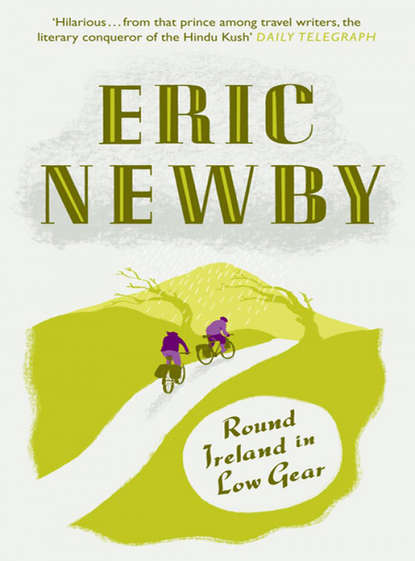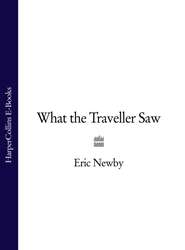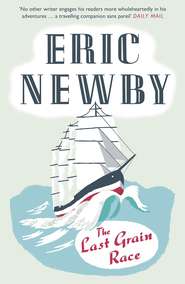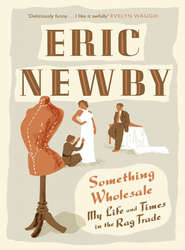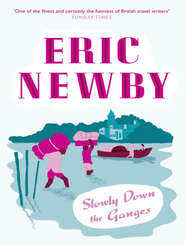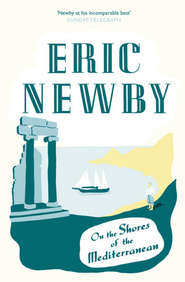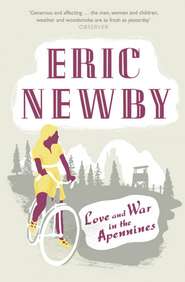По всем вопросам обращайтесь на: info@litportal.ru
(©) 2003-2024.
✖
Round Ireland in Low Gear
Автор
Год написания книги
2018
Настройки чтения
Размер шрифта
Высота строк
Поля
Round Ireland in Low Gear
Eric Newby
'You've had some pretty crazy ideas in your life, Newby, but this is the craziest.' Grandmother Wanda Newby was exasperated after continuous rain, snow, and gales that knocked from her bike. Twice.To avoid other tourists, Eric Newby had decided that the depths of winter would be the very best time to explore Ireland by mountain bike. More astonishing still, he managed to persuade Wanda, his long-suffering wife and life-long co-traveller, to accompany him - mainly, she admitted, to 'keep him out of trouble'. Lashed by winter storms, fuelled by Guinness and warmed by thermal underwear, their panniers laden with antique books on Ireland, the elderly adventurers cycle the highways and byways, encountering hospitable locals, swaying saints and ferocious dogs.From the shores of Donegal to the holy mountains, Newby guides the reader on a tale of mishap and magic, all in his own peculiar style of humour and charm, relishing his never-ending curiosity of the world and his insatiable quest for adventure.
ERIC NEWBY
Round Ireland in Low Gear
DEDICATION (#ulink_9789d328-c616-56ef-b486-b6739e6afa0e)
For the Irish,
the Eighth Walking (and Talking)
Wonders of the World
CONTENTS
Cover (#u6b82c127-521f-5d76-bf9c-0994717c9683)
Title Page (#uac8110fb-8eb7-544a-9fed-ac1656c8e712)
Dedication (#uc66c13b9-0213-5f4e-ba97-eee592edc944)
Introduction (#u61ecd8af-eee0-579b-a6b9-62da137184bd)
PART ONE December (#u2bda394a-5111-505d-8e53-dfb6b99dc75c)
1 State-of-the-Art (#u922aa0d4-6c6c-562a-a40d-a3006bcf9104)
2 To the Emerald Isle (#u74acd8af-78dd-501a-bcfe-effec55c7315)
3 Birthday on a Bicycle (#u78638948-4306-55f0-bebb-f480c08d1349)
4 Round the Burren (#u64b4f666-051d-592f-89c2-323b3bc1a479)
5 Land of Saints and Hermits (#uf48f2b51-a7df-5daf-b948-0cd20246bc0b)
6 In the Steps of St Brigid (#litres_trial_promo)
PART TWO January (#litres_trial_promo)
7 Through Waterford to Cork (#litres_trial_promo)
8 Through the Realms of Moving Statues (#litres_trial_promo)
9 A Night in Ballinspittle (#litres_trial_promo)
10 On the Road to Skibbereen (#litres_trial_promo)
11 Return to Kilmakilloge (#litres_trial_promo)
PART THREE June (#litres_trial_promo)
12 Dublin Unrevisited (#litres_trial_promo)
13 Main Line to Shannon Harbour (#litres_trial_promo)
14 To the Fair at Spancil Hill (#litres_trial_promo)
15 To the Aran Islands (#litres_trial_promo)
16 Stormy Weather (#litres_trial_promo)
17 An Ascent of Croagh Patrick (#litres_trial_promo)
PART FOUR October (#litres_trial_promo)
18 Last Days in Ireland (#litres_trial_promo)
Epilogue (#litres_trial_promo)
Bibliography (#litres_trial_promo)
Index (#litres_trial_promo)
Acknowledgements (#litres_trial_promo)
About the Author (#litres_trial_promo)
Praise (#litres_trial_promo)
Also by the Author (#litres_trial_promo)
Copyright (#litres_trial_promo)
About the Publisher (#litres_trial_promo)
Footnotes (#litres_trial_promo)
INTRODUCTION (#ulink_3fdc6fba-5133-5371-9db3-9e42e98afbf1)
The roads are very variable, some being grand, others very bad. Intercourse with the peasantry will be found interesting and amusing. Nothing can exceed their civility and courtesy; and for those who are not too particular it will be found an excellent plan to lunch in their cottages, excellent tea, home-made bread, butter and eggs being procurable for 1s. [5p] a head.
The Cyclists’ Touring Club Irish Road Book, c. 1899
In the autumn of 1985, more or less on the spur of the moment, we decided to go back to Ireland and travel through as much of it as we could in the space of three months or so, starting in the South. The North could wait. If things improved there, so much the better. If they got worse we would simply not go there. We were not going to travel in the guise of sociologists, journalists or contemporary historians. I was unlikely to write a book called Whither Ireland? or Ireland Now. We were not going there, we hoped, to be shot at. We remembered it as it had been some twenty years previously, when it had been idiosyncratic and fun. (Romantic Ireland was long since dead and gone, as Yeats wrote, ‘with O’Leary in the grave’ – that is, if it had ever existed.) We were going there, in short, to enjoy ourselves, an unfashionable aspiration in the 1980s.
It was now mid-November. All Souls’ Day was already past. The dead season, as far as weather went, was in full sway all over the northern hemisphere and would last until Easter, and probably longer. We had no illusions about the dead season. Anywhere in the British Isles and in most parts of the Mediterranean it conjured up vistas of matchstick figures bent double by the wind, silhouetted against a colourless sea without a vessel in sight to break the monotony; sun lounges in hotels and guest houses filled with rolled-up carpet, those still open soldiering on with a skeleton staff, their proprietors in the Canaries, those left in charge in their absence never quite sober.
Eric Newby
'You've had some pretty crazy ideas in your life, Newby, but this is the craziest.' Grandmother Wanda Newby was exasperated after continuous rain, snow, and gales that knocked from her bike. Twice.To avoid other tourists, Eric Newby had decided that the depths of winter would be the very best time to explore Ireland by mountain bike. More astonishing still, he managed to persuade Wanda, his long-suffering wife and life-long co-traveller, to accompany him - mainly, she admitted, to 'keep him out of trouble'. Lashed by winter storms, fuelled by Guinness and warmed by thermal underwear, their panniers laden with antique books on Ireland, the elderly adventurers cycle the highways and byways, encountering hospitable locals, swaying saints and ferocious dogs.From the shores of Donegal to the holy mountains, Newby guides the reader on a tale of mishap and magic, all in his own peculiar style of humour and charm, relishing his never-ending curiosity of the world and his insatiable quest for adventure.
ERIC NEWBY
Round Ireland in Low Gear
DEDICATION (#ulink_9789d328-c616-56ef-b486-b6739e6afa0e)
For the Irish,
the Eighth Walking (and Talking)
Wonders of the World
CONTENTS
Cover (#u6b82c127-521f-5d76-bf9c-0994717c9683)
Title Page (#uac8110fb-8eb7-544a-9fed-ac1656c8e712)
Dedication (#uc66c13b9-0213-5f4e-ba97-eee592edc944)
Introduction (#u61ecd8af-eee0-579b-a6b9-62da137184bd)
PART ONE December (#u2bda394a-5111-505d-8e53-dfb6b99dc75c)
1 State-of-the-Art (#u922aa0d4-6c6c-562a-a40d-a3006bcf9104)
2 To the Emerald Isle (#u74acd8af-78dd-501a-bcfe-effec55c7315)
3 Birthday on a Bicycle (#u78638948-4306-55f0-bebb-f480c08d1349)
4 Round the Burren (#u64b4f666-051d-592f-89c2-323b3bc1a479)
5 Land of Saints and Hermits (#uf48f2b51-a7df-5daf-b948-0cd20246bc0b)
6 In the Steps of St Brigid (#litres_trial_promo)
PART TWO January (#litres_trial_promo)
7 Through Waterford to Cork (#litres_trial_promo)
8 Through the Realms of Moving Statues (#litres_trial_promo)
9 A Night in Ballinspittle (#litres_trial_promo)
10 On the Road to Skibbereen (#litres_trial_promo)
11 Return to Kilmakilloge (#litres_trial_promo)
PART THREE June (#litres_trial_promo)
12 Dublin Unrevisited (#litres_trial_promo)
13 Main Line to Shannon Harbour (#litres_trial_promo)
14 To the Fair at Spancil Hill (#litres_trial_promo)
15 To the Aran Islands (#litres_trial_promo)
16 Stormy Weather (#litres_trial_promo)
17 An Ascent of Croagh Patrick (#litres_trial_promo)
PART FOUR October (#litres_trial_promo)
18 Last Days in Ireland (#litres_trial_promo)
Epilogue (#litres_trial_promo)
Bibliography (#litres_trial_promo)
Index (#litres_trial_promo)
Acknowledgements (#litres_trial_promo)
About the Author (#litres_trial_promo)
Praise (#litres_trial_promo)
Also by the Author (#litres_trial_promo)
Copyright (#litres_trial_promo)
About the Publisher (#litres_trial_promo)
Footnotes (#litres_trial_promo)
INTRODUCTION (#ulink_3fdc6fba-5133-5371-9db3-9e42e98afbf1)
The roads are very variable, some being grand, others very bad. Intercourse with the peasantry will be found interesting and amusing. Nothing can exceed their civility and courtesy; and for those who are not too particular it will be found an excellent plan to lunch in their cottages, excellent tea, home-made bread, butter and eggs being procurable for 1s. [5p] a head.
The Cyclists’ Touring Club Irish Road Book, c. 1899
In the autumn of 1985, more or less on the spur of the moment, we decided to go back to Ireland and travel through as much of it as we could in the space of three months or so, starting in the South. The North could wait. If things improved there, so much the better. If they got worse we would simply not go there. We were not going to travel in the guise of sociologists, journalists or contemporary historians. I was unlikely to write a book called Whither Ireland? or Ireland Now. We were not going there, we hoped, to be shot at. We remembered it as it had been some twenty years previously, when it had been idiosyncratic and fun. (Romantic Ireland was long since dead and gone, as Yeats wrote, ‘with O’Leary in the grave’ – that is, if it had ever existed.) We were going there, in short, to enjoy ourselves, an unfashionable aspiration in the 1980s.
It was now mid-November. All Souls’ Day was already past. The dead season, as far as weather went, was in full sway all over the northern hemisphere and would last until Easter, and probably longer. We had no illusions about the dead season. Anywhere in the British Isles and in most parts of the Mediterranean it conjured up vistas of matchstick figures bent double by the wind, silhouetted against a colourless sea without a vessel in sight to break the monotony; sun lounges in hotels and guest houses filled with rolled-up carpet, those still open soldiering on with a skeleton staff, their proprietors in the Canaries, those left in charge in their absence never quite sober.





